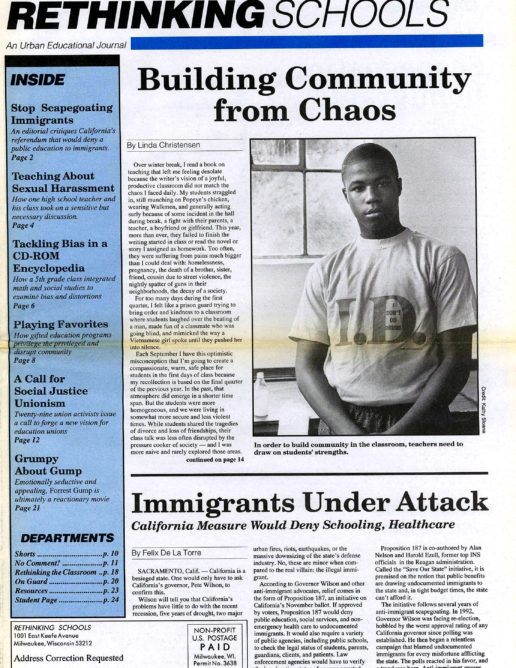Stop Scapegoating Immigrants
An editorial critiques California's referendum that would deny a public education to immigrants.
Illustrator: Toles, The New Republic

A nauseating stench pervades the anti-immigration referendum on the November ballot in California: the stench of racism.
We realize that such blunt descriptions are generally avoided in U.S. political debate, where euphemisms are routinely used to describe the most odious practices. But the specifics of the referendum make it difficult not to condemn it in the harshest terms possible.
The referendum is the latest example of how the country’s most populous state is a pioneer in regressive politics — from its anti-tax Proposition 13 in 1978, to its private school voucher initiative last year (to say nothing of how the state propelled Ronald Reagan to national prominence). Known as Proposition 187, the referendum would prohibit undocumented immigrants from receiving public health care or social services or attending public schools (see story, page 1). Further, it would turn public employees such as teachers into INS snitches, requiring them to report children, students, parents, guardians, or clients who cannot prove citizenship or legal residency.
It would be nice to think that California stands alone in its backward attitudes — and perhaps to fantasize that California’s political trends will take a tip from the state’s geography and, sooner rather than later, permanently separate from the U.S. mainland. Unfortunately, California’s reactionary upsurge is in sync with the national mood.
Across the country, politicians have been rushing to out-do each other in proposing social policies based on racial scapegoating. The most popular political sport in 1994 has been blaming welfare mothers (read, promiscuous African-American women), criminals (read, gun-totin’, drug-crazed African-American men), and immigrants (read, Latinos and Asians with hordes of children) for this country’s social and economic problems. Thus, conveniently, criticism is deflected away from the main source of the unease that has settled over America — the momentous effects of the growing internationalization of the economy in this post-Cold War era. As U.S.-based corporations are increasingly free to roam the world in an unfettered search for higher profits, they are less concerned with job creation and the fulfillment of social responsibilities in their “home” country. What does it matter if millions of Americans are without jobs?
Less expensive labor is available throughout the world. What does it matter if public education and personal safety are increasingly endangered for most Americans? The well-to-do will be able to buy what they need in the “education marketplace,” secure in suburban enclaves protected by the latest in high-tech security (and reassured by the knowledge that no matter what happens to other social services, the police and the prisons will always get the money they need).
One cannot blame merely the Republicans or the right wing for the nasty turn toward the politics of scapegoating. The Clinton administration, in fact, has masterfully tried to appropriate just about every major Republican initiative. For welfare — two years and you’re off. For crime — three strikes and you’re out. For schools — set “world class” standards. For families — impose Judeo-Christian values. The message is always the same: if you have a problem, it’s your fault. If you would work harder, adopt better values, and act more like middle-class white Americans (the last point rarely articulated but always assumed), everything would be okay.
Blaming Children
In a country dominated by such political debate, California’s Proposition 187 is particularly obnoxious. Blaming young children for the state’s education and economic woes is offensive to anyone with a shred of ethics. Yet that is what is happening. Gov. Pete Wilson, in fact, has had the gall to air a 30-second television ad that bemoans there are 300,000 illegal immigrant children in the public schools costing the state $1.5 billion. “And they keep coming,” the ad complains. Wilson, who apparently has decided to grovel at the altar of demagoguery in order to win re-election, then says: “It’s unfair to the people who are working hard, paying taxes, educating their children, and here we are rewarding people who enter the country illegally.”
Arguing that illegal immigrants are the source of unemployment, higher taxes, and spiraling healthcare and social service costs, meanwhile, flies in the face of well-documented studies. For example, a 1992 U.S. Department of Justice study found that less than 1% of immigrants legalized under the 1986 amnesty had received general assistance, Social Security, SSI, worker’s compensation or unemployment insurance. Less than one-half of 1% received food stamps or AFDC. As for jobs, it is well known that California’s agriculture industry is dependent on immigrants, who overwhelmingly work at jobs that most U.S. citizens will not take because of the low pay, lack of benefits, and horrendous working conditions.
A recent poll found that 60% of Californians support the initiative. While it’s unclear whether such sentiment will dominate when it’s time to vote in November, opponents of the proposition clearly need both moral and financial support. We encourage you to contribute to the organization listed on page 3. Even if you don’t live in California, the spillover from Proposition 187 is bound reach your state, city, and school. It’s time to stop this anti-immigrant nonsense before it gets more absurd — and more dangerous.

